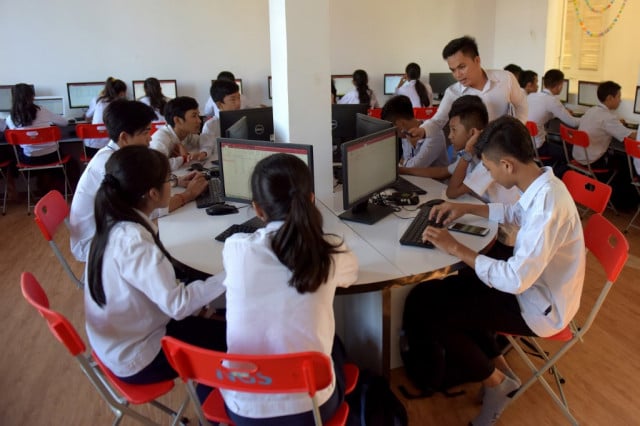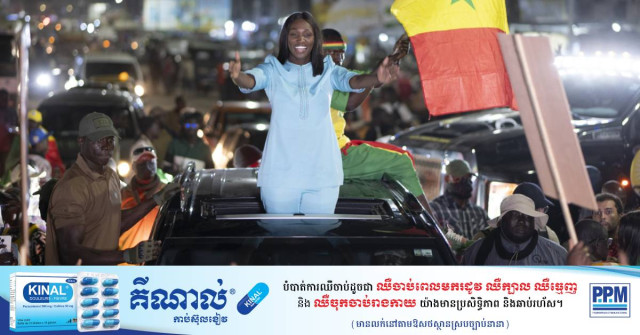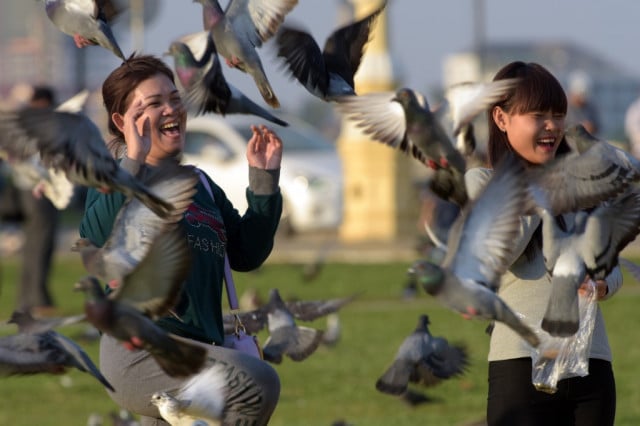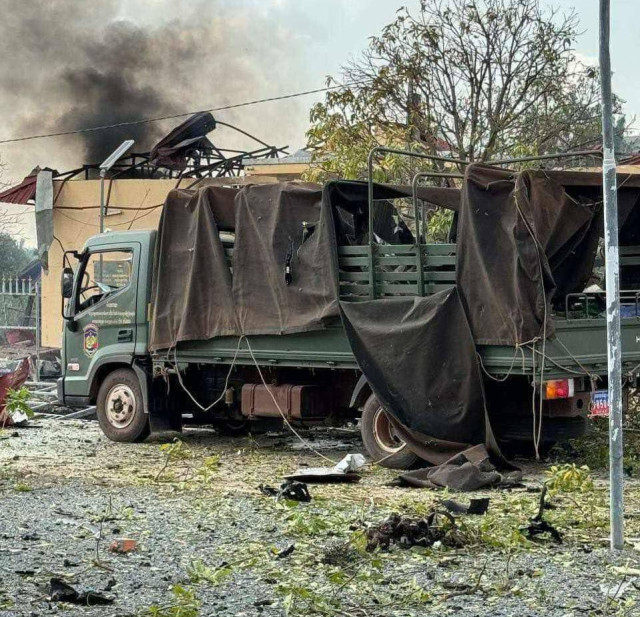From Rural Dreams to Global Skies: The Journey of Tola at the U.S. Air Force Academy

- By Sao Phal Niseiy
- April 7, 2024 8:00 PM
PHNOM PENH — Choosing a career in the military sector is not an easy decision for many young people. However, for Long Tola, residing in a rural district of Kampong Speu Province, it has always been his dream to study and work in the military sector. His dream took a big step forward when he was awarded a scholarship to pursue his degree at the United States Air Force Academy in 2020.
Tola was born into a middle-income family in Viel commune, Kong Pisey District. His father serves in the Royal Cambodian Air Force, and his mother is a teacher. After completing high school, Tola decided to take an exam to join the military.
“At first, I took the military entrance exam,” he said. “After passing it, I underwent six months of intensive training at Tlok Tasek military school in Kampong Speu. In 2017, I got the chance to enroll in the National Defense University to study English.”
Developing a Strong Passion for the Air Force
However, Tola’s passion for the Air Force grew stronger when he moved to study and joined military training in Phnom Penh, and also when he started to frequently visit his father’s workplace.
"As I was liking the Air Force more and more, I decided to request a transfer from the armed forces to the Air Force. My father didn't express any opposition or support for my decision to switch branches,” Tola said. “There, I served in the Air Forces for two years before applying for a military scholarship in the United States.”
Tola said that, when he served in the Air Force, he spent most of his time researching military aircrafts, particularly the speed system and the strength of the most advanced jet fighters in the contemporary world.
As his knowledge and understanding of the Air Force industry grew, Tola paved the way to apply for a scholarship offered by the U.S. government to get a chance to study at a U.S. military academy. He was selected in 2020 to study at the U.S. Air Force Academy.

“Before I got awarded [the scholarship], I officially applied for it twice,” he said. “To get the scholarship, we have to go through different tests including SAT (or ACT), TOEFL, and the Candidate Fitness Assessment (CFA).
“My first application in 2019 was rejected, but I made it when I applied again in 2020,” Tola explained, revealing that the most difficult part for him had been reaching the requirements under the SAT and TOEFL tests.
When he was in Kampong Speu province, Tola had only studied English with the Buddhist monks at the pagoda and taken some informal English classes in his village. He had not received any formal English training until he moved to Phnom Penh during his final years of high school.
“These tests are to ensure that our language proficiency is good enough as we have to study in English throughout the program,” Tola said. “Because we are not native speakers, our language ability is limited, and we need to try hard to complete the requirements in these tests although I could do well in the Candidate Fitness Assessment (CFA).”
As Tola said, his physical assessment test score had already proved to the committee that he was determined to pass. “That is why what we must do is not to give up on our dreams, and instead try to develop our language capacity more,” he explained.
Going through Challenging Military Training amid COVID-19 Chaos
When Tola got the scholarship in 2020, his parents were extremely excited about his journey to the U.S. Air Force Academy, he said. But at the same time, they were concerned since the world was going through the COVID-19 chaos.
“For me, getting this opportunity was what I had dreamed of for a long time.,” Tola said. “But my parents were just anxious as the situation was arduous during the pandemic.”
When he arrived at the academy, every aspect of life changed including school regulations, making his life more challenging.
“One thing I believe was hard was wearing a mask all the time, including when doing intensive physical training,” Tola said, adding that the basic cadet training during the first six weeks had been a very difficult part for him and that a few students in his cohort had decided to give up on the training and quit their studies during those first weeks.
“The different oxygen levels that vary with the altitudes also contributed significantly to my difficulties when training wearing masks,” he added.

Another challenge for him as an international student included online learning and the honor system that strictly ensures that students do not cheat and study hard to pass exams. Moreover, food and cultural differences also added some burdens for him, but these got better with time as he could gradually adjust and adapt.
According to Tola, the decision to end financial support for Cambodian cadets made by the U.S. government in 2021 also created difficulties for him.
“The decision posed a great challenge for me,” he said. “But thanks to the Cambodian government that acted swiftly to address it and provided a financial package to support me and other Cambodian cadets…we could finish our studies.”
In 2021, the U.S. government announced that Cambodia had lost the legitimacy to gain military support due to the reduction in traditional military-to-military relations between the two countries. This prompted the Cambodian government to provide financial support to six Cambodian students enrolled at military academies in the United States.
For Tola, the resumption of scholarship provision by the U.S. government for Cambodian military students is what he wants to see. “I want this to happen as studying [at the U.S. Air Force Academy] is exceptional,” he said. “Moreover, I want the scholarship to focus on supporting the candidates who have a strong knowledge and comprehension of our country as well as the ability to contribute back. This will allow these candidates to know their role and to make good use of their knowledge and expertise when returning home.”
Bringing Knowledge Back Home
At the Air Force Academy, Tola who is pursuing a degree in Aeronautical Engineering will be graduating in July 2024.
“After completing our four-year studies here, we need to continue our studies for another two years if we want to fly aircraft,” Tola said, indicating that he went through different flight trainings over the past years through powered fly mode.
“However, this only applies to [United States] students,” he said. “For me, I won’t have this chance. I must return to Cambodia upon graduation, but I could look into my opportunities to learn to fly aircrafts at schools in different countries.”
Taking courses to fly helicopters, cargo aircraft, and fighter jets is on Tola’s list, but he needs to create such opportunities and first gain more support from the Cambodian government.

When asked what kind of contribution he could make upon returning home, he responded that he could make use of the knowledge he gained based on the current conditions of Cambodia’s defense sector given the fact that aeronautical engineering work may be more demanding in countries with advanced defense sectors.
“As an aeronautical engineering student, I learn specifically about aircraft machinery,” Tola said. “Some of the students here work for aviation companies such as Boeing and the defense industry such as Lockheed Martin. But the problem I can see is that we do not have a field in which I can use this knowledge in our country yet.
“Though this may sound challenging, I will utilize my knowledge, skills, and expertise based on the actual situation, and I believe I can do a great deal to help our Air Force sector,” he said.
As an Air Force student, Tola holds great hope that in the future, he can also play a role in supporting small aircraft design works.
“This can happen when we have more resources to invest, and I believe we can build small aircrafts, and we can import machines and assemble them as it is not costly,” he explained. Tola’s goals also encompass working on machinery design and working as a flight instructor for Cambodian Air Force personnel.
“Now, we send our students to different countries to get trained to fly,” he said. “If the right time comes, we can do it by ourselves and train the younger generation through our domestic flight schools.”
“We Should Be Proud of Our Country”
As a scholarship student pursuing his studies at one of the most prestigious military academies, Tola also has a message for young Cambodians.
“I think our country has many outstanding and intelligent people. But it is imperative that we learn international languages such as English if we want to come to study in the U.S.,” he said, adding that they must make sure they have good SAT and ACT scores.
“It is not difficult if we are persistent and try our best to study,” Tola said.
One important thing besides learning an international language that young Cambodians should keep in mind is to be proud of their nation, he said.
“We must know that our country has gone through such a tragic past including civil war, and we must recognize the fact that development has different stages,” he explained. “The emerging or existing problems our country is facing need to be handled and addressed collectively by our people, and we need constructive criticism.”
Tola went on to say that it requires that people develop their capacity so that they can help develop their nations. “Regardless of where we are or where we live, it is enough that we understand our country’s condition and love our nation,” he concluded.
















